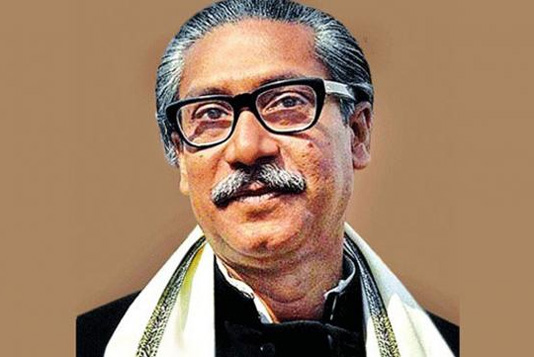Bangabandhu … statesman among statesmen
By dint of Bangabandhu’s statesmanship, Bangladesh was steered into the United Nations and at the same time, Sheikh Mujib pursued the goal of coming out of superpower rivalry, and two years after liberation in 1971, Bangladesh joined the Non-Aligned Movement

By Saleem Samad
Bangabandhu Sheikh Mujibur Rahman, days after he returned home following more than nine months of languishing in a prison in Pakistan — “a journey from darkness to light”— in early January 1972 was catapulted to being a statesman of the third world.
After Bangabandhu, the independence hero of Bangladesh, took charge of the war-ravaged country of 75 million, he soon became an icon of independence, freedom, democracy, socialism and secularism of the south-south nations.
The brutal birth of Bangladesh, after a bloody war with the marauding Pakistan military along with its Islamist militia and dreaded henchmen, as a new sovereign state in South Asian politics with its very strategic geographic location and in the midst of very complicated international politics was a significant event in modern history.
Bangladesh was born at the time ‘when a global transformation of power was going on with the formation of the Indo-Soviet axis vis-a-vis Sino-American rapprochement which not only had a bearing on the emergence of Bangladesh but also had an impact on the foreign policy of the country that was emerging’.
The emergence of Bangladesh as an independent state in 1971 in South Asia appears to be a unique phenomenon in international affairs.
Immediately after Sheikh Mujib’s homecoming, Bangladesh achieved recognition from all major countries, except Saudi Arabia and China. He was able to establish Bangladesh in the comity of nations.
He declared, “I would like it [Bangladesh] to become the Switzerland of the East.” The word Switzerland had two meanings – peaceful coexistence and national development.
The enigmatic world leader in his casual dress in long flowing punjabi, pyjama and black vest dubbed as ‘Mujib Coat’, declared that Bangladesh would steer clear of the Cold War and would remain non-partisan in the tug of the Cold War between the US and the Soviet Union.
The charismatic leader became personal friends with a wide range of global personalities — from Indira Gandhi of India to Fidel Castro of Cuba, from Houari Boumediene of Algeria to Marshal Josip Broz Tito of Yugoslavia to Anwar Sadat of Egypt, Alexei Kosygin of the Soviet Union to Zayed bin Sultan Al Nahyan of the Emirates, from Sir Edward Heath of the United Kingdom to Kakuei Tanaka of Japan, and from Senator Edward Kennedy to Prince Karim Aga Khan.
His contacts with the equally charismatic US leader Senator Edward Kennedy allowed Sheikh Mujib to express his thanks to the American people for their unflinching support for Bangladesh’s independence, which eventually laid the foundations of Bangladesh’s relations with the United States.
With the help of Bangabandhu’s international friends and admirers, Bangladesh joined the Organisation of the Islamic Conference (OIC), the Commonwealth of Nations and the Non-Aligned Movement (NAM).
The iconic Cuban leader Fidel Castro compared Mujib’s personality with the Himalayas. “I have not seen the Himalayas, but I have seen Sheikh Mujib. In personality and in courage, this man is the Himalayas. I have thus had the experience of witnessing the Himalayas,” the Cuban supreme leader remarked during the Non-Aligned Summit in 1973.
For Sheikh Mujib, the Chinese veto to appease Pakistan in blocking Bangladesh’s membership to the United Nations was a passing cloud, a test of time.
By dint of Bangabandhu’s statesmanship, Bangladesh was steered into the United Nations and at the same time, Sheikh Mujib pursued the goal of coming out of superpower rivalry, and two years after liberation in 1971, Bangladesh joined the Non-Aligned Movement. At the NAM summit in 1973, Bangabandhu was able to draw the attention of world leaders to his diplomacy of friendship for all and malice to none.
Addressing the UN General Assembly on 25 September 1974, Sheikh Mujib categorically said, “Bangladesh has consistently pursued an independent non-aligned foreign policy promoting friendship with all countries of the world based on mutual respect for sovereignty, equality, territorial integrity and non-interference in the internal affairs of other’ states”.
His statesmanship earned him global accolades. The World Peace Council honoured him with the Julio-Curie Peace Prize for his extraordinary contribution to the oppressed people of the world on 23 May 1973, and from “Bangabandhu”, friend of Bengal, he became a universal friend.
No other global leaders could become such popular “friends of the world”, as Bangabandhu Sheikh Mujibur Rahman could. His career as a national politician and as a global statesman will surely be remembered in the years to come.
(The writer is an independent journalist, media rights defender, recipient of Ashoka Fellow (USA) and Hellman-Hammett Award. Twitter @saleemsamad,)